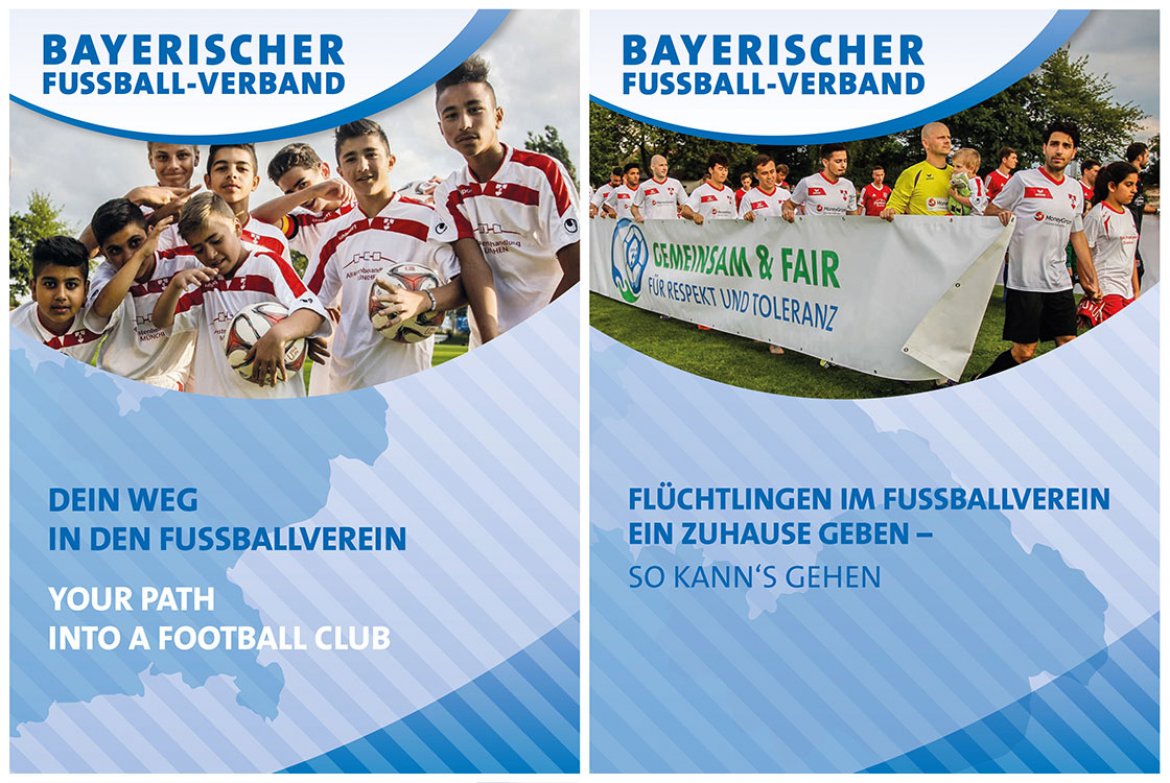
Study on integrating refugees at soccer clubs in Bavaria
How does cooperation work between soccer clubs in Bavaria and local refugees? This was the question which the team at the FH Kufstein Tirol was tasked with answering. Prof. (FH) Dr. Claudia Stura, deputy director of studies for Sports, Culture and Event Management, investigated structures and measures, evaluated the need for cooperation and drew up a list of recommendations. Another area covered were the pre-requisites required for soccer clubs in Bavaria to accept and integrate refugees.
“The association has developed a brochure describing important experiences and success factors when it comes to integrating refugees into soccer clubs. The content of this brochure is based on the outstanding work carried out by Prof. (FH) Dr. Claudia Stura and her team, which carried out interviews with local soccer clubs to find out what the challenges are in this area,” says Reinhold Baier, vice president and integration officer at the Bavarian Soccer Association. “The results of the study have allowed us to develop recommendations for the clubs and to speak to the refugees directly now that we know what their wishes and needs are. This means refugees who are interested in football receive information on how clubs are organized, training opportunities and the best way to get in touch the clubs themselves.”
Positive experiences working with refugees
Prof. (FH) Stura interviewed 32 representatives of football clubs, both professionals and volunteers, as well as 35 refugees from 15 selected soccer clubs in Bavaria. The clubs were selected to provide the greatest possible diversity concerning the size of club, the number of refugees they work with and their geographical location. The interviewees had a generally positive experience of working with refugees both in a sporting context and also more generally within the day to day life of the club. They added that a lack of German language skills is the most common barrier to integration, though there are often big differences between the individual refugees. In situations where communication in German is not possible, English and French as well as gestures and facial expressions are used.
The commitment of the association and the brochures it has published have gone down well with supporters on a local level. “Two refugees who live with us already play for the local soccer team and two more will be joining them this year,” explains Anita Heindl, who runs a refugee housing center in Immenreuth. “The brochure also supports the integration of the refugees. For example, it has common words and expressions used in soccer in German, English and Arabic. This helps refugees to use the German language.”
Personal contact helps reduce anxiety
A factor which makes it easier for refugees to integrate into a soccer team is having teammates from similar countries and cultures. This, according to the interviewees, builds trust and confidence. At the same time, some representatives of soccer clubs added that having a limited number of refugees in each team made it easier to ensure communication between everyone in the team. When it comes to everyday differences, the study states that many are related to religious practices and are, as such, respected within the club. The brochure, which will be distributed to refugee centers, also contains organizational information. “Although many refugees sign up to play, there are quite a few who don’t come to training sessions and games regularly,” reports Gabriele Fischer, head of the local authority for refugees in Wunsiedel. “This multi-language brochure is particularly useful because it also explains how things are run and structured within a soccer club.”
Studies already published show that direct personal contact between the local population and refugees often helps reduce skepticism and prejudices. This is confirmed by Dieter Baumgärtel, chairman of the association Verein Zuflucht in Selb e.V. “The brochure is very important when it comes to integrating refugees into life at the soccer clubs. It is full of explanations to overcome any concerns the refugees might have. Thanks to the words and expression in three languages it also helps with communication between players, coaches and refugees. Some local teams already have refugees playing for their teams who became aware of the opportunity thanks to this brochure,” explains Baumgärtel.
In order to make sure that integration is a success, the Bavarian Soccer Association wants to focus on making the clubs themselves more welcoming towards people from different countries and backgrounds and underline the important role clubs play in the local community when it comes to combating all forms of racism.
Brochures bring clubs and refugees together
The interviews showed that refugees join soccer clubs in order to stay physically active and also in order to help in the local community. For soccer clubs, refugees are therefore a potential source of not only new players but also new volunteers. In order to successfully bring these two groups together, the Bavarian Soccer Association has published two brochures based on the results of the study carried out by the FH Kufstein Tirol.
One brochure is aimed at refugees and provides information in German, English and Arabic about how to start training with a local soccer team. It also gives general information on how clubs are structured and the criteria players have to meet in order to play. The second brochure, which is aimed at soccer clubs, gives information on how to contact refugees, how to reduce anxiety and prejudices on both sides as well as on insurance issues and financial support. The Bavarian Soccer Association will distribute the brochures to local soccer clubs as well as refugee centers and other social institutions and refugee housing centers.